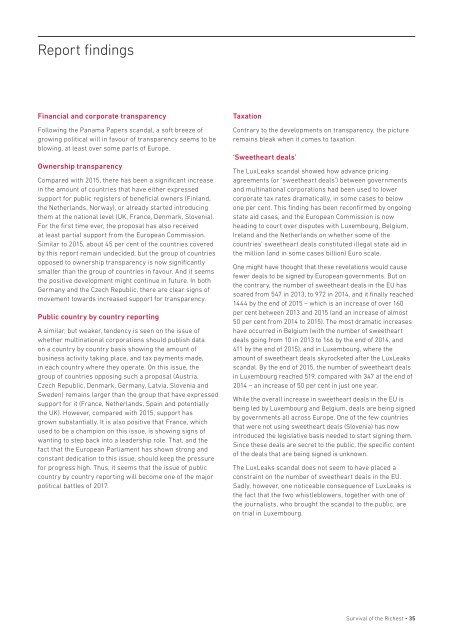You also want an ePaper? Increase the reach of your titles
YUMPU automatically turns print PDFs into web optimized ePapers that Google loves.
Report findings<br />
Financial and corporate transparency<br />
Following <strong>the</strong> Panama Papers scandal, a s<strong>of</strong>t breeze <strong>of</strong><br />
growing political will in favour <strong>of</strong> transparency seems to be<br />
blowing, at least over some parts <strong>of</strong> Europe.<br />
Ownership transparency<br />
Compared with 2015, <strong>the</strong>re has been a significant increase<br />
in <strong>the</strong> amount <strong>of</strong> countries that have ei<strong>the</strong>r expressed<br />
support for public registers <strong>of</strong> beneficial owners (Finland,<br />
<strong>the</strong> Ne<strong>the</strong>rlands, Norway), or already started introducing<br />
<strong>the</strong>m at <strong>the</strong> national level (UK, France, Denmark, Slovenia).<br />
For <strong>the</strong> first time ever, <strong>the</strong> proposal has also received<br />
at least partial support from <strong>the</strong> European Commission.<br />
Similar to 2015, about 45 per cent <strong>of</strong> <strong>the</strong> countries covered<br />
by this report remain undecided, but <strong>the</strong> group <strong>of</strong> countries<br />
opposed to ownership transparency is now significantly<br />
smaller than <strong>the</strong> group <strong>of</strong> countries in favour. And it seems<br />
<strong>the</strong> positive development might continue in future. In both<br />
Germany and <strong>the</strong> Czech Republic, <strong>the</strong>re are clear signs <strong>of</strong><br />
movement towards increased support for transparency.<br />
Public country by country reporting<br />
A similar, but weaker, tendency is seen on <strong>the</strong> issue <strong>of</strong><br />
whe<strong>the</strong>r multinational corporations should publish data<br />
on a country by country basis showing <strong>the</strong> amount <strong>of</strong><br />
business activity taking place, and tax payments made,<br />
in each country where <strong>the</strong>y operate. On this issue, <strong>the</strong><br />
group <strong>of</strong> countries opposing such a proposal (Austria,<br />
Czech Republic, Denmark, Germany, Latvia, Slovenia and<br />
Sweden) remains larger than <strong>the</strong> group that have expressed<br />
support for it (France, Ne<strong>the</strong>rlands, Spain and potentially<br />
<strong>the</strong> UK). However, compared with 2015, support has<br />
grown substantially. It is also positive that France, which<br />
used to be a champion on this issue, is showing signs <strong>of</strong><br />
wanting to step back into a leadership role. That, and <strong>the</strong><br />
fact that <strong>the</strong> European Parliament has shown strong and<br />
constant dedication to this issue, should keep <strong>the</strong> pressure<br />
for progress high. Thus, it seems that <strong>the</strong> issue <strong>of</strong> public<br />
country by country reporting will become one <strong>of</strong> <strong>the</strong> major<br />
political battles <strong>of</strong> 2017.<br />
Taxation<br />
Contrary to <strong>the</strong> developments on transparency, <strong>the</strong> picture<br />
remains bleak when it comes to taxation.<br />
‘Swee<strong>the</strong>art deals’<br />
The LuxLeaks scandal showed how advance pricing<br />
agreements (or ‘swee<strong>the</strong>art deals’) between governments<br />
and multinational corporations had been used to lower<br />
corporate tax rates dramatically, in some cases to below<br />
one per cent. This finding has been reconfirmed by ongoing<br />
state aid cases, and <strong>the</strong> European Commission is now<br />
heading to court over disputes with Luxembourg, Belgium,<br />
Ireland and <strong>the</strong> Ne<strong>the</strong>rlands on whe<strong>the</strong>r some <strong>of</strong> <strong>the</strong><br />
countries’ swee<strong>the</strong>art deals constituted illegal state aid in<br />
<strong>the</strong> million (and in some cases billion) Euro scale.<br />
One might have thought that <strong>the</strong>se revelations would cause<br />
fewer deals to be signed by European governments. But on<br />
<strong>the</strong> contrary, <strong>the</strong> number <strong>of</strong> swee<strong>the</strong>art deals in <strong>the</strong> EU has<br />
soared from 547 in 2013, to 972 in 2014, and it finally reached<br />
1444 by <strong>the</strong> end <strong>of</strong> 2015 – which is an increase <strong>of</strong> over 160<br />
per cent between 2013 and 2015 (and an increase <strong>of</strong> almost<br />
50 per cent from 2014 to 2015). The most dramatic increases<br />
have occurred in Belgium (with <strong>the</strong> number <strong>of</strong> swee<strong>the</strong>art<br />
deals going from 10 in 2013 to 166 by <strong>the</strong> end <strong>of</strong> 2014, and<br />
411 by <strong>the</strong> end <strong>of</strong> 2015), and in Luxembourg, where <strong>the</strong><br />
amount <strong>of</strong> swee<strong>the</strong>art deals skyrocketed after <strong>the</strong> LuxLeaks<br />
scandal. By <strong>the</strong> end <strong>of</strong> 2015, <strong>the</strong> number <strong>of</strong> swee<strong>the</strong>art deals<br />
in Luxembourg reached 519, compared with 347 at <strong>the</strong> end <strong>of</strong><br />
2014 – an increase <strong>of</strong> 50 per cent in just one year.<br />
While <strong>the</strong> overall increase in swee<strong>the</strong>art deals in <strong>the</strong> EU is<br />
being led by Luxembourg and Belgium, deals are being signed<br />
by governments all across Europe. One <strong>of</strong> <strong>the</strong> few countries<br />
that were not using swee<strong>the</strong>art deals (Slovenia) has now<br />
introduced <strong>the</strong> legislative basis needed to start signing <strong>the</strong>m.<br />
Since <strong>the</strong>se deals are secret to <strong>the</strong> public, <strong>the</strong> specific content<br />
<strong>of</strong> <strong>the</strong> deals that are being signed is unknown.<br />
The LuxLeaks scandal does not seem to have placed a<br />
constraint on <strong>the</strong> number <strong>of</strong> swee<strong>the</strong>art deals in <strong>the</strong> EU.<br />
Sadly, however, one noticeable consequence <strong>of</strong> LuxLeaks is<br />
<strong>the</strong> fact that <strong>the</strong> two whistleblowers, toge<strong>the</strong>r with one <strong>of</strong><br />
<strong>the</strong> journalists, who brought <strong>the</strong> scandal to <strong>the</strong> public, are<br />
on trial in Luxembourg.<br />
<strong>Survival</strong> <strong>of</strong> <strong>the</strong> <strong>Richest</strong> • 35


